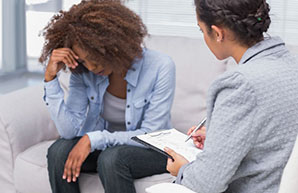Johannesburg student Mabel Setsumi, 22, was diagnosed with borderline personality disorder (BPD) in 2014. She bravely shares her story with us…
My terror of abandonment
“Before I was diagnosed, I always dealt very badly with feelings of abandonment from the people I was closest to. When someone left, I felt that I had done something wrong and blamed myself. I would always do my best to hang on to them, even if it meant putting my dignity on the line.
If I felt that I was losing someone, I would make them the centre of my world; everything revolved around them and how I could keep them happy, and in my life. I would neglect other aspects of my life, for example, schooling, which led to me failing my second year in university. I always placed more importance on others because I thought and felt that that was where my happiness came from.
My life began to change in adolescence
“These feelings began when I was 13 and starting high school. My friends from primary school and I began to change. There were new children in the school and different friendships began to form, many on the basis of popularity, smarts and talent. I did not fit in and I often felt lonely and abandoned, especially by my old friends.
I felt incredibly different from everyone else. I wasn’t as smart or pretty and, unlike the children I went to school with, I wasn’t rich. Although I got a bursary to a top private school, I did not belong. I took taxis and wore a second-hand uniform and my school bag was not a Billabong.
Funny looks, giggles about inside jokes that didn’t include me, weekend plans that I was not invited to – everything got to me. There was a point where I hated everything about myself and wished I could be the complete opposite.
So, I created a new self on the Internet: “Catfishing” is what it’s called nowadays. I would spend every moment when I wasn’t at school on the Internet in chatrooms pretending I was a beautiful white girl with blonde hair who had a doctor for a mother and lived in a prestigious neighbourhood. The Internet was the only place where I felt accepted.
Facing up to my battle
“I still feel very different to other people, especially with regard to my financial situation. My mother is a domestic worker. I often wonder what it would be like to be a ‘normal’ person who doesn’t wake up every day and wonder why they’re still alive. I feel like not one single person in the world could possibly understand how I feel on a daily basis: the pain, the self-loathing, the loneliness, the worthlessness.
In most of my relationships, my insecurities impact the bond that I have with other people, many of whom end up feeling helpless, and that they are in a toxic relationship. Everything becomes about me and at some point, they feel that they can no longer co-exist in such a one-sided relationship.
The importance of being a caregiver and a friend
“My mother has been understanding. Because I don’t live with her during the school year, we don’t speak often but she is always concerned with how I am coping and if I am happy. She’s incredibly supportive and does anything and everything in her power to make me happy.
If you have a loved one with borderline personality disorder, it’s important to always offer support and a listening ear, even if you do not really understand what they are going through. It’s always great to know that someone will always love you, no matter how unloved or unlovable you feel.
It’s important to give them space when it’s needed, and to know when to coddle or give tough love. And as important as it is to be there, it’s also good for a person with BPD to learn to be there for themselves and that only they can save themselves.
Never give up
“I believe it’s important to fight to love and accept yourself, to find peace within yourself. Surround yourself with individuals who are loving and supportive, and do your best to maintain a positive atmosphere. Challenge negative thoughts with positive ones even if you do not believe them at first.
Make yourself a priority and never sit around waiting for someone else to save you. Envision what you think is worthy in a person and wake up every single day with a mission in mind to become that person. Find a source of strength for the days when you’re struggling: a book, a quote, a movie character, God, your mother or father.
When someone leaves and you feel abandoned, remember that everything happens for a reason. Do not be bitter or hateful or angry; those are such heavy and draining emotions. Deal with it as best you can and let it go. We gain, we lose and sometimes a loss is not a loss at all.
Do not lose pieces of yourself in another person. You’re a whole human being and you don’t need another to complete you. And lastly, when you feel like you have had enough, always, always, always try one more time.”
If you need help
If you or a loved one is suffering from depression, anxiety or any other mental health issues, contact The South African Depression and Anxiety Support Group (SADAG) on 011 234 4837 or visit www.sadag.org for more information.
IMAGE CREDIT: 123rf.com

